Pine needles may not be the first thing that comes to mind when you think of natural herbal medicine, but they actually do have a lot of benefits! This pine needle cough syrup is easy to make and is helpful for calming coughs and soothing sore throats.
Medicinal Benefits of Pine Needles
What better way to make natural medicine than with the trees around us!
The needles of most species of pine trees have both edible and medicinal properties. They are aromatic and have antibacterial and pain relieving properties.
Pine needles, along with most other conifer needles, are high in vitamin C and can be used as an expectorant for coughs and for relieving chest congestion.
When pine needle tea is combined with honey to make a syrup, it is highly beneficial for soothing a dry and scratchy throat and helping to tame coughs.
This recipe is from my book Healing Herbal Infusions, be sure to check it out if you are interested in more herbal remedies like this one!
Which Pine Needles are Safe to Use?
Most pine and other conifer needles are edible and have medicinal uses. Just be certain of your conifer tree identification, as there are a few species that you want to steer clear from. Do not use Yew as it is toxic!
Pregnant women should avoid using the needles from Ponderosa Pine.
Besides pine, other conifer needles you can use in this recipe are fir, spruce, or hemlock (the coniferous tree, not the toxic herbaceous plant).
The best part is that conifer needles are easy to forage year round. They are perfect for fall foraging and winter foraging!
Related: 30+ Conifer Needle Recipes: Drinks, Desserts, Syrups, Balms & more!
How to Make Pine Needle Cough Syrup
This recipe comes together very quickly and easily!
First, bring the water to a boil then pour it over the pine needles in a pint mason jar. You are essentially making pine needle tea.
For a stronger pine needle flavor you can boil the pine needles in the water for a few minutes before taking off the heat. Just be aware that this does diminish some of the vitamin C content.
Let the infusion steep until the water has cooled to room temperature, then strain out the pine needles and stir in the honey.
Store the syrup in a covered jar in the refrigerator and it will keep for 2-4 weeks. If you’d like to increase the shelf life of this syrup, freeze it in baggies or ice cube trays and then thaw as needed before use.
How to Use Pine Needle Cough Syrup
Take one tablespoon (15ml) every two hours as needed to ease a cough, relieve chest congestion, or to soothe a dry and scratchy throat.
This syrup is safe for children ages 2 and older, but be sure to give the little ones a smaller dose. I have a handy dosing guide for children based on their ages in my book Healing Herbal Infusions.
Pine Needle syrup should not be given to children under the age of one due to the raw honey.
Beyond being medicinal, this syrup is very tasty and is nice to have around for the holiday season for mixing into cocktails or mocktails!
I’m definitely going to do that this season, maybe mixed with some infused winter gin? Yes please!
Healing Herbal Infusions
This pine needle cough syrup is one of the recipes in my book Healing Herbal Infusions, which is packed full of herbal remedies for everyday ailments.
It includes infusion recipes in seven different categories:
- boosting immunity
- soothing aches and pains
- relieving what ails you
- easing digestion
- embracing inner well being
- nourishing skin, lips, and hair
- supporting mother and child
The recipes I’ve created for Healing Herbal Infusions are simple and straightforward. They are easy enough for a beginner to understand and carry out, yet accessible to herbalists of every level.
Take control of your health naturally with this guide to natural herbal medicine!
More Immune Support Remedies
These are some of my other favorite herbal remedies to support our bodies during cold and flu season.
- Elderberry Syrup
- Rose Hip Syrup
- Fermented Honey Garlic
- Fermented Elderberry Honey
- Immune Boosting Herbal Tea
- Elderberry & Echinacea Tincture
- Fire Cider
Pine Needle Cough Syrup
Ingredients
- 1 1/4 cup water
- 1 cup fresh pine needles or other edible conifer needles
- 1/2 cup raw honey
Instructions
- Bring the water to a boil then pour it over the pine needles in a pint mason jar. For a stronger pine needle flavor you can boil the pine needles in the water for a few minutes before taking off the heat. (Just be aware that this does diminish some of the vitamin C content).
- Let the infusion steep until the water has cooled to room temperature, then strain out the pine needles and stir in the honey.
- Store the syrup in a covered jar in the refrigerator and it will keep for 2-4 weeks. If you’d like to increase the shelf life of this syrup, freeze it in baggies or ice cube trays and then thaw as needed before use.
Notes
- Most pine and other conifer species are edible and have medicinal uses. Just be certain of your conifer tree identification, as there are a few species that you want to steer clear from. Do not use Yew as it is toxic!
- Take one tablespoon (15ml) every two hours as needed to ease a cough, relieve chest congestion, or to soothe a dry and scratchy throat.
- This syrup is safe for children ages 2 and older, but be sure to give the little ones a smaller dose. I have a handy dosing guide for children based on their ages in my book Healing Herbal Infusions.
- Pine Needle syrup should not be given to children under the age of one due to the raw honey.
- Reprinted with permission from Healing Herbal Infusions by Colleen Codekas, Page Street Publishing Co. 2018. Photo credit: Colleen Codekas.
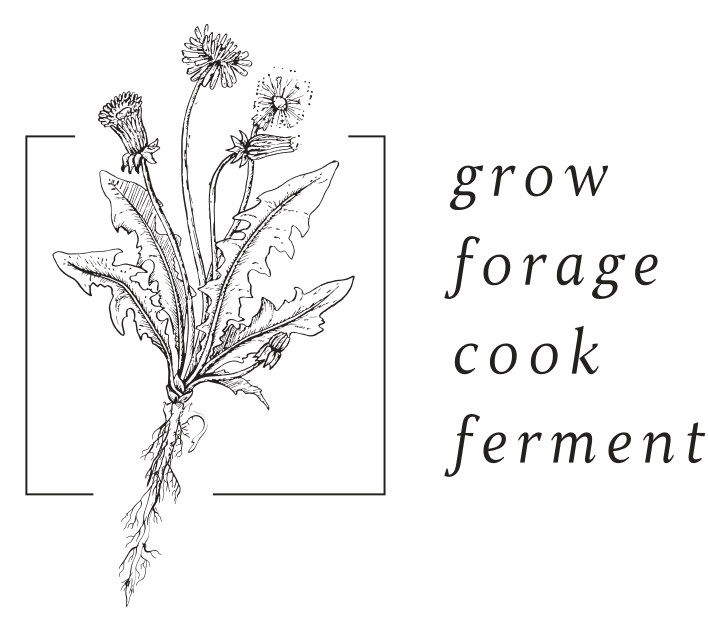
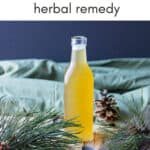
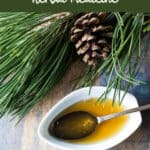
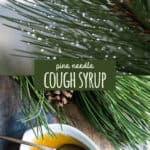
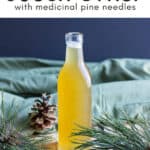
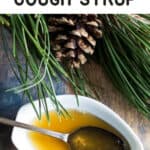
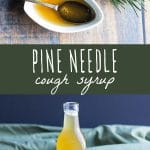
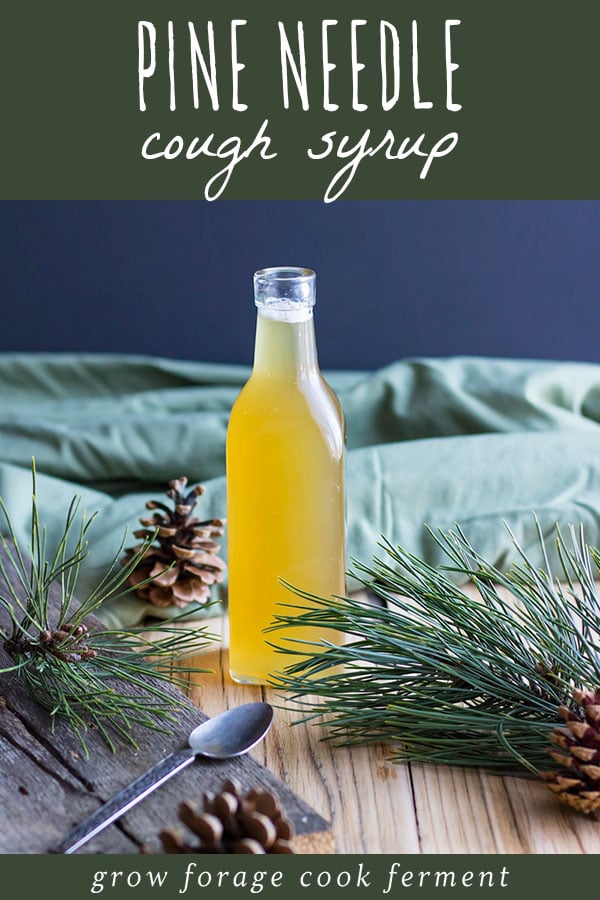
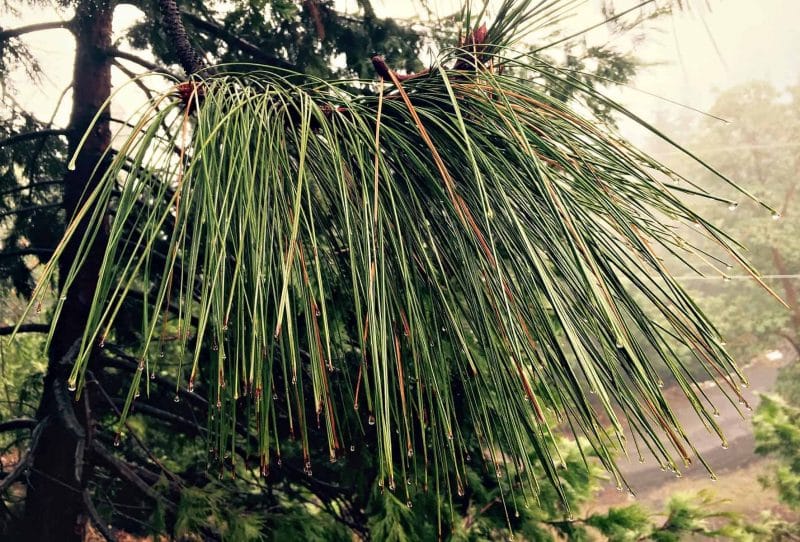
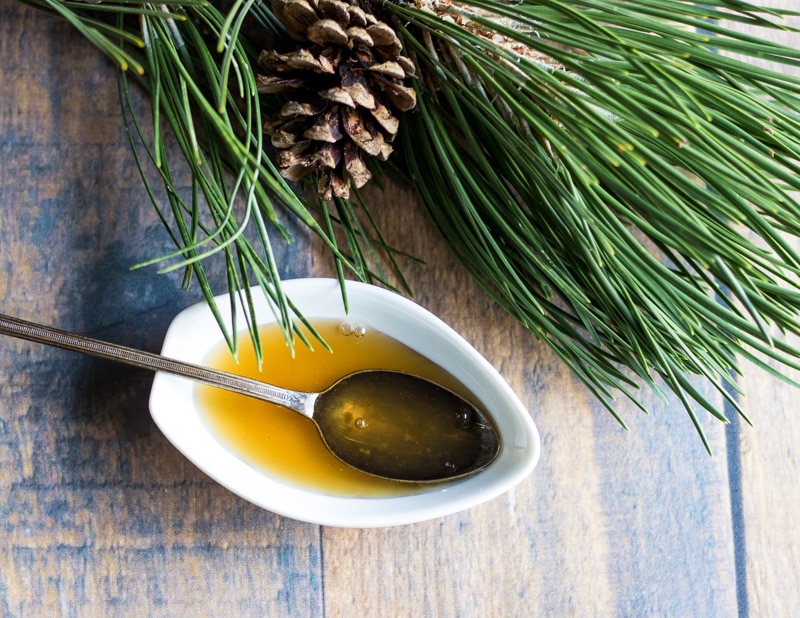
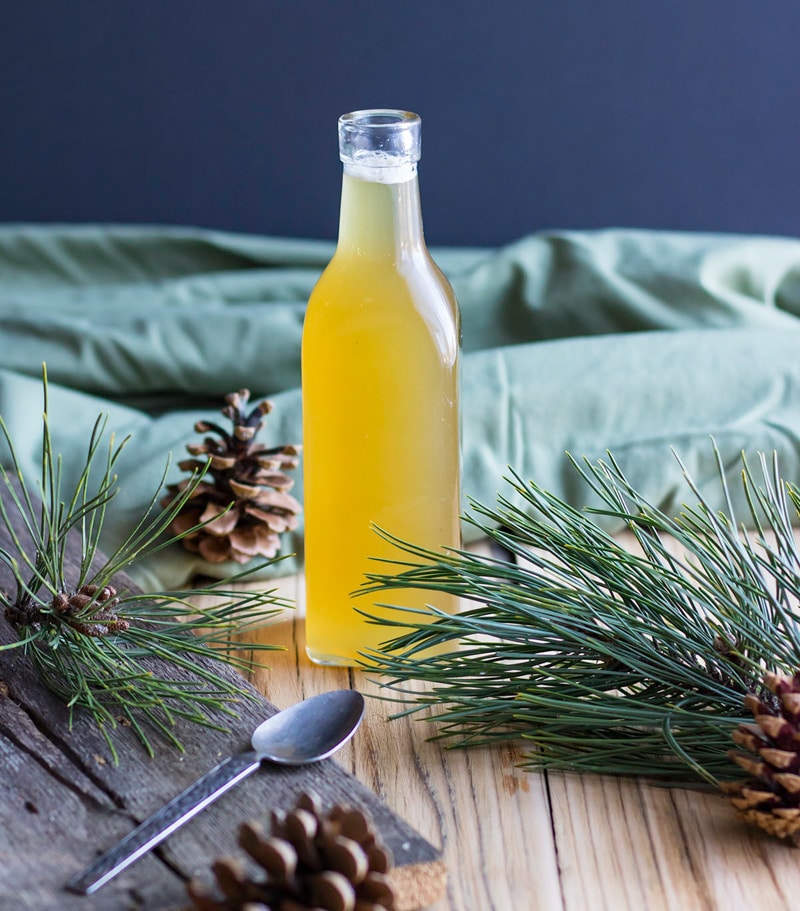
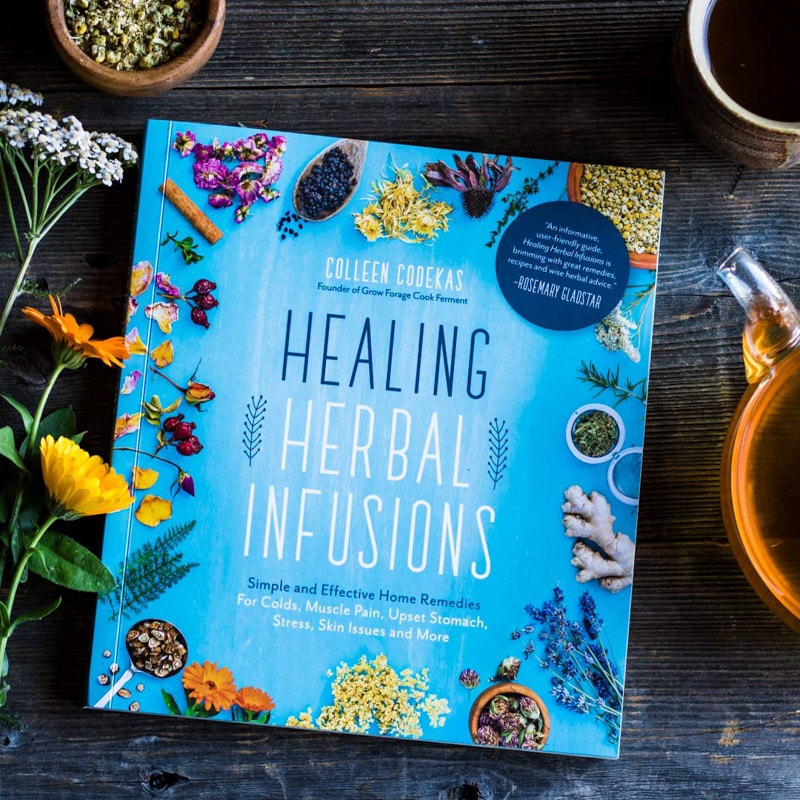
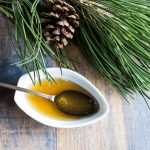

Hi! I was wondering if you knew about if I could can it. Would it last that way? Or is freezing it the only way?
I am wondering the same. Did you ever find the answer?
The canning process would destroy the beneficial bacteria in the raw honey, so freezing is the only way to go when it comes to extending the shelf-life of this pine needle cough syrup.
I think if I were to want to can it to have on hand I would can it without tvs honey and I would add that in when I was ready to use it, just a thought
I’m wondering – you say that dried needles wouldn’t be as beneficial, but if you doubled the amount? I can get lovely pine, but it means making an hour long trip, as pine trees don’t grow where I live.
I boiled the needles in water until they were mostly brown and left them in the water to cool to room temp. Seems it may have soaked up the water – recipie barely made 1 cup ? Is it going to be too strong for my little one who is 3 years
add more water, she says To make it stronger boil it with the needles. Small children usually require a lesser dose of everything
Just to let you know, I’ve read over and over on the topic of pine needle herbal remedy whether tea or cough syrup —> not to boil the pine needles. It will eliminate the vitamin C and possibly other vitamins.
The correct approach is to pour boiling water over the pine needles to let it steep for 10 minutes. Cover the cup or container while steeping.
Would Balsam fir, Fraser Fir or Canaan fir tree needles work?
Can you use Douglas Fir? Thanks.
Information says Infusion time 14 days, Instructions say steep until room temperature. Do you have to leave it 14 days before you use it. Needs clarifying. Thanks
Hi Nancy, sorry that was a mistake, you do not need to leave it for 14 days before using. I’ve fixed the recipe now!
I gave this a try recently and although I really enjoyed the flavor I needed something more viscous for my sore throat. So, I boiled it down into more of a syrup consistency. I know, I killed all the beneficial microorganisms in the raw honey, but man, did it make a difference and put that damn cough to bed!
Tracey, if you were to do it again, would you boil the pine needles for long before adding the honey?
Boiling the pine needles will largely eliminate the vitamins. Just pour boiling water over pine needles to steep for 10 to 15 mins. In fact I’ve read that the water shouldn’t even be boiling but super hot – before the boil. Its important to preserve the anti-microbial and astringent qualities by not ever boiling the pine needles. You could probably steep a large amount of pine needles and ratio of water, and then maybe simmer down to a syrup.
How long can this be frozen?
Do you have a printer version of this recipe?
Can pine essential oil be used? What would the measurements be?
I do not recommend using pine essential oil. Essential oils are not safe to be ingested.
…you cannot ingest essential oils!
There are certain oils by doterra or young living that can be ingested. They are labelled. Not all are though
Is it necessary to refrigerate? Honey wouldn’t need to be, I don’t know about the needles, once cooked?
Asking because I’d like to send this to someone a distance away.
Because there is pine needle tea added to the honey it will eventually start to ferment and could possibly go bad if not refrigerated. It will be fine for several days without refrigeration though!
Can it, 10 minutes on full rolling boil!
How do you know the needles that are poison?
All pine needles are safe to use. The only conifer that you want to avoid using is the Yew family.
Hi, can i also use dried pine needles and how much would i need. No fresh pine in close proximity.
Would love the answer to this also?
I would only use fresh pine (or other conifer) needles. Dried will not have as much of the beneficial compounds.
I have eastern re cedar trees. Will they work ok?. TIA
I make cedar tea all the time ! Great for a good immune boost!
What do you think about Redwood Needles? I live in the Redwoods and have used the Needles for a yummy honey, also I have made tea with the Needles. Would they work for this?
Yes, redwood needles would work wonderfully!
Hello, I’d love to try making some! But, does it have to be raw honey? It can be hard to find!
Raw honey has many medicinal benefits so that’s what I recommend to use. It will still be ok without it, but not quite as beneficial.
Any pine needles? There’s a difference between white and red pine.
All pine needles and most conifer needles will work! Just avoid the yew tree as it is toxic.